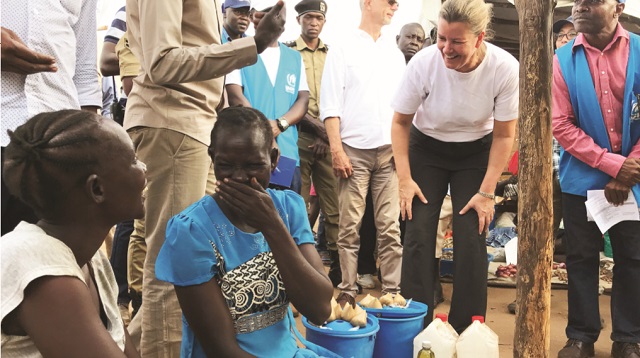
What UNHCR Chief learnt from recent visit to Uganda’s refugee settlements
Kampala, Uganda | RONALD MUSOKE | Kelly Clements, the Deputy High Commissioner for the UN refugee agency UNHCR, recently saw firsthand the ever-growing task of caring for hundreds of thousands of vulnerable South Sudanese refugees when she visited Uganda.
“My lasting memory in Moyo was meeting primary and secondary school students, their parents and their teachers under a very big tree,” she told journalists in Kampala, “We did that because this is a school that is bursting at the seams.”
She saw a primary school with an enrollment rate of 94% because education is free but learnt that less than 20% of refugee children are able to attend secondary school because they cannot afford school fees.
She was moved by a story of a 22-year old refugee woman who committed suicide after learning she would not be able to pay school fees to complete her last year of secondary education. The dropout rates among refugees have had a damaging effect including alcoholism, teenage pregnancy and early and forced marriage.
This was Clements’ second visit to Uganda in three years but it appears the scale of refugee needs in the country still amaze her.
She was in the country for five days starting March 07 and specifically toured refugee settlements in the northwestern Ugandan districts of Adjumani, Moyo and Yumbe where 67% of refugees in the country are hosted.
Flanked by Joël Boutroue, the UNHCR Country representative in Uganda and Raouf Mazou, the director UNHCR for the Africa regional bureau, Clements said during a media briefing in Kampala on March 12 that keeping girls in school is a higher priority for UNHCR and its partners. She said the UNCHR intends to offer more support by, for instance, paying for teachers, providing learning materials and furniture.
“We all want to prevent a generation of young people from being lost because they feel the future holds so little for them,” she said, “It is in places like Parolinya (Moyo District) that more global solidarity with countries and people hosting refugees must be demonstrated.”
When Clements crossed over to Adjumani to interact with women entrepreneurs and refugee leaders, she was told education, health and environmental issues are the primary concerns in the sub-region.
Clements was, however, impressed by the good working relationship between the refugees and local communities, particularly in Moyo District.
“It is good that the refugees and local communities are working together, are schooling and training together and they are conserving the environment together and they are co-existing peacefully.”
“We know that some of the schools that have been set up certainly to respond to the emergence are not sufficient and are overcrowded but that equally applies to Ugandan schools as it does in refugee settlements.”
As part of UNHCR’s focus on education, she announced that the UN refugee organization intends to re-allocate over Shs 375 million (US$100,000) to ensure young students can continue studying in secondary school in Parolinya refugee settlement.
 The Independent Uganda: You get the Truth we Pay the Price
The Independent Uganda: You get the Truth we Pay the Price



